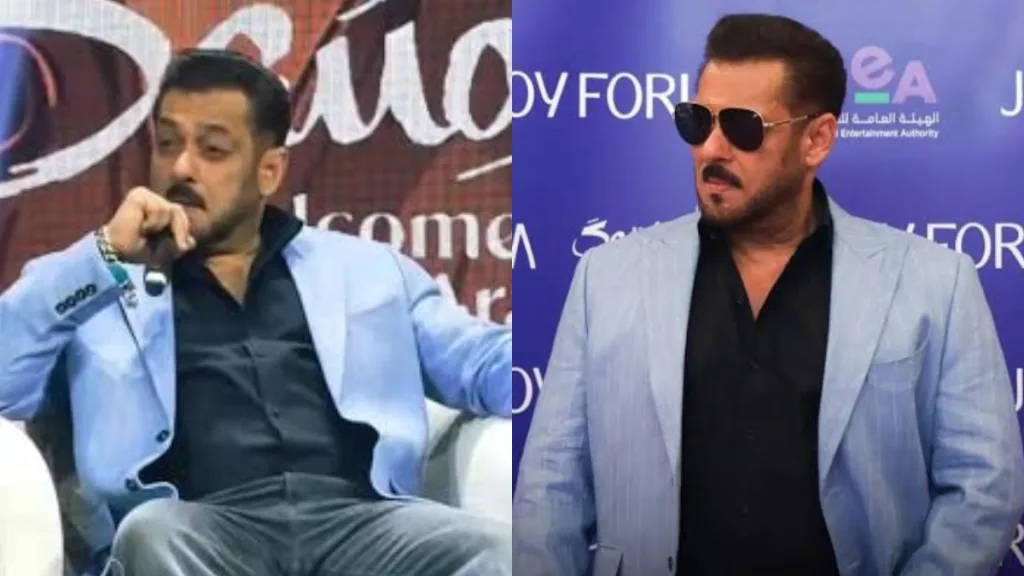Bollywood superstar Salman Khan has landed in an unexpected international controversy after his recent remarks at the Joy Forum in Abu Dhabi triggered a furious reaction in Pakistan. The actor, known for his candid off-screen persona, made an offhand comment referring to Balochistan, a region long at the heart of India-Pakistan tensions. The statement led to Pakistan’s federal authorities reportedly declaring him a “terrorist sympathiser,” escalating a diplomatic row that has taken both countries’ media by storm.
The controversy erupted after a short video clip from the event went viral across social media platforms. In it, Salman can be heard responding to a question about peace in South Asia. “We must recognise the pain of people living under oppression, like those in Balochistan,” he said, adding that “art and cinema can bridge the divides that politics cannot.” What appeared to be a well-intentioned humanitarian remark was quickly interpreted by Pakistani officials as an endorsement of “India’s interference in Balochistan.”
Within hours, Pakistan’s Ministry of Information and Broadcasting issued a strongly worded statement accusing the actor of “inciting anti-Pakistan sentiment” and “endorsing separatist narratives.” State-run news channels repeatedly aired segments labelling Salman a “terrorist sympathiser” and calling for a blanket ban on his films across Pakistani theatres and digital platforms.
A senior Pakistani minister reportedly went so far as to demand the United Nations take note of what he described as “hate speech disguised as celebrity activism.” Social media in Pakistan soon exploded with hashtags such as #BanSalmanKhan and #BalochistanPropaganda, with thousands of users calling for the actor’s global boycott.
Also Read: Rakhi Sawant Defends ‘Dharti Pe Devta’ Salman Khan, Blasts Abhinav Kashyap: ‘Takle Ko Ande Marungi’
In India, reactions were sharply divided. Several Bollywood celebrities and public figures came out in defence of the actor, calling the Pakistani response “absurd” and “politically motivated.” Actor Anupam Kher tweeted that Salman’s words were “a call for peace and humanity, not politics,” while filmmaker Ashoke Pandit accused Pakistan of using the controversy to distract from its internal issues.
Meanwhile, members of the ruling Bharatiya Janata Party (BJP) termed the Pakistani statement “yet another example of intolerance toward free speech.” A few right-wing voices, however, urged Salman to be “more responsible” while commenting on politically sensitive subjects, noting that such statements can easily be misinterpreted in a volatile geopolitical climate.
Political analysts suggest that the uproar over Salman’s statement highlights how Balochistan remains an emotional and politically charged issue in Pakistan. The region, rich in natural resources but plagued by separatist movements and heavy militarisation, has long been a flashpoint in India-Pakistan relations. While India officially denies any involvement in Balochistan’s internal affairs, Pakistan frequently accuses Indian intelligence agencies of supporting separatist groups in the area.
Experts also note that the incident underscores how soft power diplomacy—through film, culture, or celebrity influence—can inadvertently trigger hard political reactions. “Celebrities are now part of the geopolitical conversation,” said Dr. Samir Patil, an international relations scholar. “When a star of Salman Khan’s stature mentions Balochistan on an international stage, it carries symbolic weight that governments cannot ignore.”
The controversy has reignited debates within Bollywood about the risks of celebrities commenting on political or diplomatic matters. Some insiders argue that stars should remain cautious when addressing issues tied to national security, while others believe it is their responsibility to use fame for global awareness.
For Salman Khan, the incident has cast a sudden shadow over his usually apolitical public image. The actor, who has been busy promoting his upcoming film slated for release this Diwali, is reportedly considering releasing a formal clarification video to “set the record straight.”
Despite Pakistan’s official stance, the reaction among the general public in both countries has been mixed. While nationalist groups in Pakistan continue to demand a ban, many Pakistani fans have defended the actor online, calling the government’s response “overblown” and “hypocritical.” “Salman Khan is not a politician,” one Twitter user from Karachi wrote. “He speaks for peace. We should listen, not attack.”
As of now, the Indian government has not issued any statement regarding Pakistan’s declaration. However, diplomatic watchers believe that if the matter escalates, it could strain already tense cultural exchanges between the two neighbours.
For Salman Khan, the episode serves as a reminder of how celebrity voices can ripple far beyond cinema. A single comment, made in goodwill, has now transformed into an international controversy—one that has once again placed Bollywood at the crossroads of politics and diplomacy.

